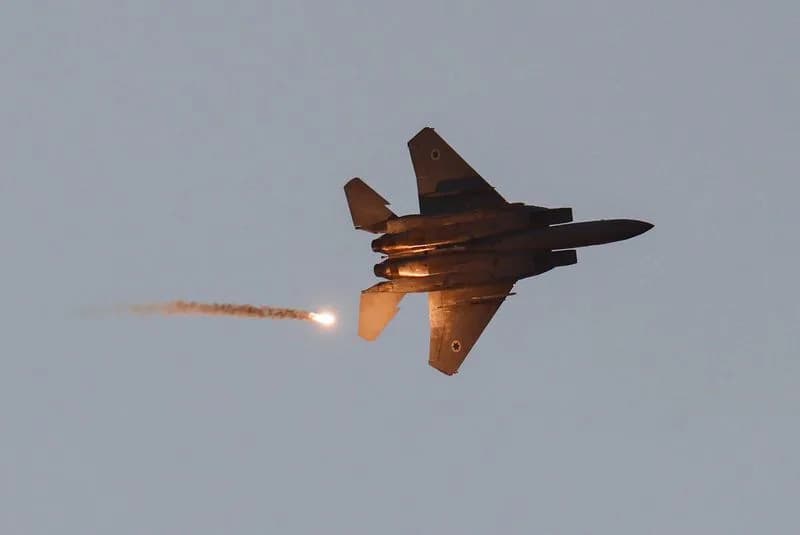Germany under Chancellor Friedrich Merz is accelerating rearmament and is increasingly dependent on Israeli defence technology, including drones, air-defence systems and missiles. Leaked procurement documents and major contracts — such as €2bn for Spike missiles and €4bn for Arrow 3 — underline the scale of cooperation. Israeli officials describe the partnership as having deep historical resonance, while critics in Germany question Berlin’s response to allegations about Israel’s conduct in Gaza. Despite tensions, procurement and intelligence ties between Berlin and Tel Aviv are strengthening.
Eighty Years After the Holocaust, Israel Is Arming Germany — A Complex Turn in History

Eighty Years After the Holocaust, Israel Helps Rebuild Germany’s Military
"Das ist die Drecksarbeit, die Israel macht, für uns alle," Chancellor Friedrich Merz told a reporter at the G7 summit — translated as, "Israel is doing the dirty work for all of us." The terse exchange encapsulated an unexpected strategic intimacy between the descendants of a genocidal regime and those of its victims.
Under Mr Merz, Germany is undertaking an ambitious rearmament program aimed at building what the chancellor calls "the strongest conventional army in Europe." After years of limited defence investment, his government has opened the door to substantial, potentially open-ended spending on equipment and capability upgrades. The coalition is also pursuing a return to conscription via lottery and assembling a roughly €377bn procurement wish list.
What stands out in Germany’s rearmament is how heavily it is leaning on Israeli technology: missiles, drones and air-defence systems are central to the plan. Leaked procurement documents show €700m earmarked for loitering, self-detonating drones from Elbit and a further €100m for ammunition to arm Heron UAVs produced by Israel Aerospace Industries. Earlier agreements include a €2bn deal for Spike anti-tank missiles (a joint venture with Rafael) and a €4bn purchase of Israel’s Arrow 3 air-defence system.
Berlin also relies on Israeli intelligence cooperation. German authorities have credited an "extensive" Mossad-led Europe-wide effort in disrupting plots against Jewish and Israeli targets on German soil. Officials and MPs in Mr Merz’s CDU describe Germany as becoming "hugely dependent" on Israeli capabilities in drone technology, reconnaissance and air defence.
Senior Israeli defence officials say the partnership has a powerful symbolic dimension: after the Holocaust, the fact that Germany now looks to Israeli systems to protect its citizens carries "deep historical resonance," in the words of Major General Amir Baram, director-general of Israel’s defence ministry. "It is not defined by past wounds but by a shared commitment to prevent their return," he said.
That historical sensitivity is personal for Mr Merz. The Telegraph previously uncovered Nazi-era documents showing his maternal grandfather, Josef Paul Sauvigny, was a Nazi party member and served as mayor of Brilon during the Third Reich. Mr Merz has displayed visible emotion when confronting Germany’s past, notably when he wept while reopening Munich’s Reichenbachstrasse synagogue.
Not everyone welcomes the close ties. Critics in Germany accuse Mr Merz’s government of turning a blind eye to allegations — denied by Israel — that its conduct in Gaza amounts to genocide or is producing famine. Berlin briefly paused some weapons deliveries in August amid controversy over how Israeli systems might be used in Gaza, a move that reflected strain in the relationship with Prime Minister Benjamin Netanyahu’s government.
Mr Merz himself has voiced unease about civilian harm in Gaza. He has said it was becoming "increasingly difficult to understand" Israel’s objectives there and warned that extensive civilian casualties cannot be justified solely as a fight against Hamas. Israel, while defensive of its actions, has responded to such criticism from Mr Merz with restraint: "When Friedrich Merz raises this criticism of Israel, we listen very carefully because he is a friend," said Ron Prosor, Israel’s ambassador to Berlin.
Despite friction and public debate, defence procurement and intelligence cooperation between Germany and Israel continue to deepen. The partial pause in deliveries did not halt major contracts — the Spike missile deal, for example, was signed weeks after the pause was announced — and Berlin’s reliance on Israeli technology appears to be expanding as it seeks to respond to threats from Russia and an emboldened Iranian posture.
Bottom line: Germany’s drive to rearm has revived a strategic partnership with Israel that is both practically consequential and historically laden. The collaboration yields advanced capabilities for the Bundeswehr and closer security cooperation, even as it provokes difficult political and moral debates at home and abroad.
Help us improve.




























